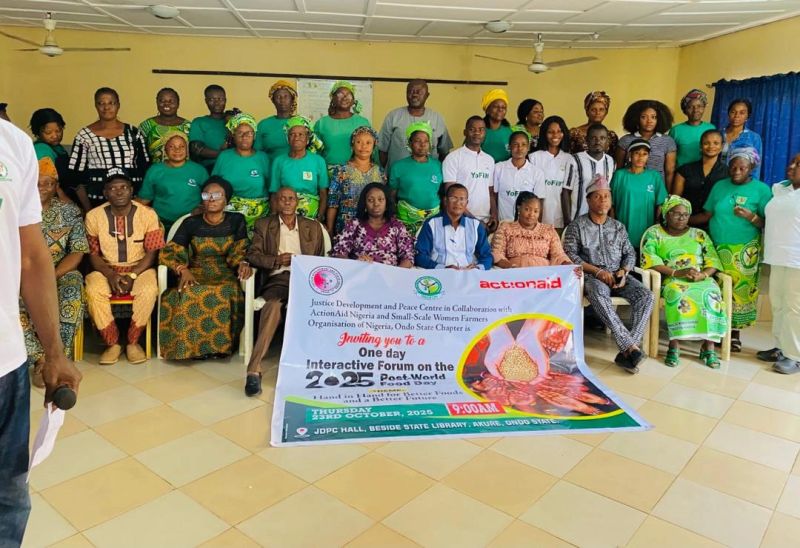Smallholder women farmers in Ondo State have called for urgent government intervention to tackle persistent challenges threatening food production and rural livelihoods.
The demand was made at the 2025 Post-World Food Day Interactive Forum organized by the Justice Development and Peace Centre (JDPC), Akure, in collaboration with ActionAid Nigeria, under the Scaling Up Public Investment in Agriculture (SUPIA II) project. The event held on Thursday, October 23, 2025, at the JDPC Hall, Akure.
Speaking at the forum, the Ondo State Coordinator of the Small-Scale Women Farmers Organisation in Nigeria (SWOFON), Mrs. Grace Oyediji, identified bad roads, epileptic electricity supply, lack of irrigation facilities, poor storage systems, insecurity of farmlands, limited access to credit, and weak market linkages as major obstacles facing women farmers.
“We face real challenges — bad roads, electricity and storage problems. These are concrete issues the government must urgently address if food production must increase. We also appeal for deliberate policies that support women farmers to thrive,” she said.
Delivering the keynote address on behalf of the Hon. Commissioner for Agriculture and Forestry, Engr. Olaleye Akinola, a representative from the ministry reaffirmed the government’s commitment to sustainable agricultural growth and inclusive participation of women and youths in the state’s food systems.
He stated that the ministry had enhanced collaborations with CSOs and farmer organizations like JDPC and SWOFON, which led to improved budgetary processes, fertilizer distribution, and training for women in different agricultural value chains.
Representing the Permanent Secretary of the Ministry of Agriculture and Forestry, Mrs. Foluke Tunde-Daramola, Mrs. Grace Ganiyu delivered a goodwill message in which she commended the resilience of smallholder women farmers and reiterated the ministry’s readiness to strengthen partnerships that promote food security and rural empowerment.
“This forum offers a vital platform for dialogue on food security, sustainable agriculture, and the empowerment of women farmers. The Ministry remains committed to inclusive agricultural development,” Mrs. Ganiyu stated.
The event featured a presentation by Mrs. Oyediji on the 2025 Kampala Declaration on Agriculture, which will guide agricultural transformation across Africa from 2026 to 2035. The declaration, adopted by African leaders in Kampala, Uganda, focuses on six strategic pillars designed to reshape agrifood systems through national and continental commitments.
Excerpts from the Six Pillars of the Kampala Declaration (2026–2035):
1️⃣ Intensify Sustainable Food Production, Agro-Industrialization, and Trade
Strengthen input systems, integrate smallholder farmers into value chains, and invest in post-harvest infrastructure.
2️⃣ Boost Investment and Financing for Agrifood Systems
Expand public and private investments, improve access to finance, and develop bankable agricultural projects.
3️⃣ Promote Human Nutrition and Health Outcomes
Support production and consumption of nutritious traditional foods, strengthen food safety standards, and address micronutrient deficiencies.
4️⃣ Advance Inclusivity and Equitable Livelihoods
Reduce the yield gap between male and female farmers, improve rural infrastructure, and create green jobs for women and youth.
5️⃣ Build Resilient Agrifood Systems
Promote climate adaptation strategies, mobilize climate finance, and strengthen early warning systems for shocks.
6️⃣ Strengthen Agrifood Systems Governance
Empower producer organizations, promote evidence-based decision-making, and ensure mutual accountability across all levels.
During the plenary session, stakeholders, including civil society organizations and youth farmer groups (YOFIN), called on the Ondo State Government to sign and implement the state’s pending gender- and disability-inclusive agricultural policy and develop a costed implementation plan to ensure equitable resource allocation.
Participants also showcased locally produced farm goods in an exhibition that underscored the potential of women farmers in driving food sufficiency and rural employment.
The forum ended with a collective call for deliberate, gender-responsive agricultural reforms and stronger government commitment to the Kampala Declaration goals, aimed at achieving food equity and resilience in Ondo State.

